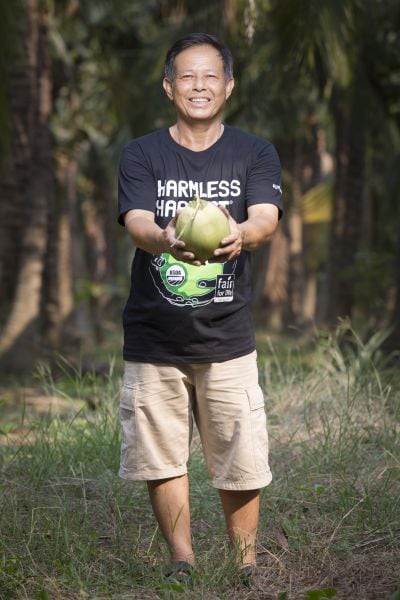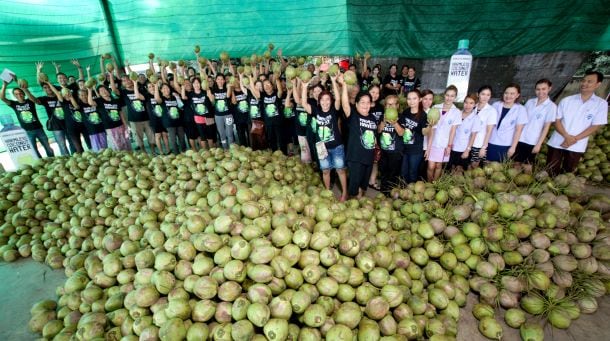The new bottles, which will roll out in April, still require refrigeration [they contain no additives or preservatives], but will have a slightly longer shelf-life, Alvarez told FoodNavigator-USA: "We anticipate being able to extend our shelf life [from 45 days] to 60 days."
Harmless Harvest has been working closely with the FDA to determine that its new proprietary multi-step filtration process ensures microbiological safety after receiving a Nov 13, 2015 warning letter from the agency raising concerns about whether HPP can keep clostridium botulinum at bay in a low acid beverage such as coconut water.
High pressure processing (HPP) – whereby foods or beverages are put into a high-pressure chamber that is flooded with cold water and pressurized (hence the term ‘cold-pressured’) in order to kill pathogens without heat - enables companies to make juices, hummus, or other products that taste exactly like the stuff you’d make at home, with no preservatives, and a shelf-life long enough to secure national distribution.
But while HPP works well in acidic cold-pressed juices, it is not as well suited for products with a higher pH, such as coconut water, said Alvarez, who claimed that Harmless Harvest had been working on alternatives for some time.
New process ensures ‘unparalleled microbiological control’
She added: “Harmless Harvest has been partnering and has had on-going conversations with the FDA for many months. We are not a technology company and therefore are not tied-up to any specific technology. However, we do have an on-going research program to develop leading processes and technologies to deliver a superior product experience. In this program we have evaluated a wide range of non-thermal processes, including HPP.
"Filtration has been published in the scientific literature for many years as a process that delivers microbiological safety – but had limitations on the sensory experience front.
"Harmless Harvest tested a broad range of processes (including multi-step filtration) and materials before identifying our final process- the one that allows us to have a superior sensory experience and flavor to any of the pasteurized/UHT products on the market while delivering unparalleled microbiological control and product quality [most coconut waters are flash pasteurized using high heat]. We don’t cook our product."
Our production costs are much higher than production costs of pasteurized products
So does taking out the HPP step mean that the overall production costs are now lower?
“No,” said Alvarez. “In fact, Harmless Harvest has added many steps which include several filtration steps and many other quality enhancing steps into our production processes.
"Our new cost including the multi-step filtration and the quality enhancements is similar to HPP, yet with advantages in more predictable performance and less damage to our packaging. Further, our overall production costs are much higher than production costs of pasteurized products."
"Our coconut water doesn't taste caramelized or burnt and it doesn't taste like lemonade as some of our competitors are acidifying their products to balance the pH levels."
Deanna Fleming, chief marketing officer, Harmless Harvest
She added: "Remember we are an ecosystem-based business that shares the welfare we create throughout our chain of custody. We pay fair living wages to our farmers and partners and are committed to our Fair for Life principles.

"Our belief is that the higher costs associated with our proprietary non-thermal process are worth it to deliver a superior sensory experience and excellence in quality.”
We are growing at twice the rate of the coconut water category
But has the warning letter and change in process dented customers’ confidence in the business, which recently raised “a significant round of capital”?
Not at all, said Alvarez, adding: “We have great partnerships and solid distribution in the natural channel, and will continue to expand into other channels this year as the demand for organic product increases. We are already in thousands of stores nationwide, from Whole Foods Market to Costco to Kroger.”
While the company is no longer using HPP, the product still tastes better than rival heat-treated products, and is organic, justifying its higher price tag, she said: “The consumer is willing to pay more for better quality as long as that quality is tangible, the marketplace has also seen a significant shift in consumer’s demand for organic products.
“We are committed to addressing this growing demand. In fact, we have already reached the $100mm mark since inception.”
She would not disclose the company’s revenues in 2015, or a forecast for 2016, but said: “I can tell you that the [coconut water] category growth rate is in the mid-teens, and we grew at more than twice the category growth rate of 2015.”

*The new 16oz bottle uses 33% less plastic while the 8.75oz bottles uses 14% less plastic.
"We are the first Fair for Life certified coconut water, through this we have offered free healthcare to farmer communities and so far have provided medical and vision check-ups to 776 farmers and their communities since the program’s inception, 80% of who had never received medical care."
Giannella Alvarez, CEO, Harmless Harvest
